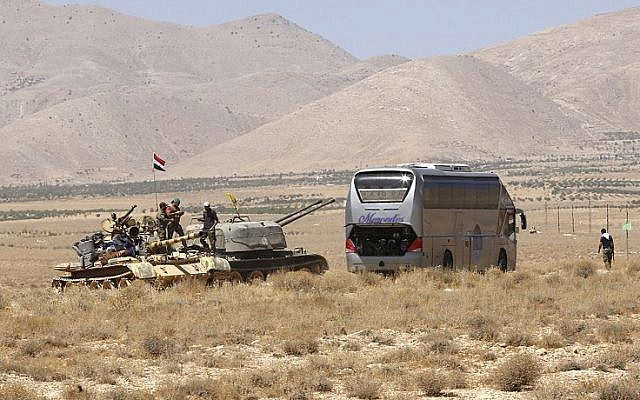DAMASCUS, Aug. 31 (Xinhua) -- The recent evacuation of hundreds of Islamic State (IS) militants and their families from a border region between Syria and Lebanon to an eastern Syrian city near Iraq has apparently caused some tension between Iraq and Hezbollah.
On Sunday, a ceasefire deal was concluded between Syria's strong ally of Hezbollah and the IS militants.
Under the deal, the remaining IS militants cornered in the barrens of the Syrian town of Qara will be evacuated from the western Qalamoun region near the Lebanese territories to the IS-held city of Bukamal in the eastern province of Deir al-Zour near the Iraqi border.
The deal was reached following a massive assault by Hezbollah and the Syrian army to clear the barrens between Syria and Lebanon from IS.
The deal was implemented on Monday, when around 700 IS militants and their families evacuated the badlands of Qara and headed toward Bukamal.
Iraq's Prime Minister Haider al-Abadi said Tuesday the deal was "unacceptable" and an "insult to the Iraqi people."
"We wished they would discuss with us. We ask the Syrian government to cooperate with us and to launch an investigation into the issue," Abadi said.
Abadi also slammed the negotiation of Hezbollah and IS as "unjustified" because there must be cooperation to eradicate terrorism, not negotiation.
"We are not seeking to contain the terrorists, but to eliminate them," Abadi said.
On Thursday, Hezbollah leader Hassan Nasrallah defended the evacuation deal, saying his forces will be fighting the IS militants in Deir al-Zour.
Nasrallah said that the transfer of the IS militants was carried out inside the Syrian territories, not from Lebanon to Iraq.
In response to the Iraqi stance, the Hezbollah leader said in a statement that the number of the evacuated wasn't large, saying around 310 militants were transferred and the rest are their family members.
Nasrallah said the "defeated and broken" IS militants "who have lost the will to fight" would not change anything in the battle equation in Deir al-Zour, where tens of thousands of IS militants are stationed.
He said the intended destination of the transferred IS militants is in the frontline of the Syrian desert, where the Syrian army and its allies are waging intense battles for months against the IS group.
Nasrallah made it clear that his forces were spearheading the fight against IS in the Syrian desert near Deir al-Zour and "thus we are moving the IS militants from a front we are fighting at to another front where we are fighting as well."
Defending the deal, Nasrallah said the main reason for concluding the deal is to close the file of the kidnapped Lebanese soldiers who had been snatched by IS in 2014.
Under the deal, the IS militants revealed the fate of the kidnapped soldiers, who turned out to have been killed by the terror-designated group.
Their bodies were unearthed and their families have been officially informed that their sons were dead.
"In Lebanon, we have had a national and humanitarian cause, which is the case of the kidnapped Lebanese soldiers by Daesh, and the Lebanese consensus was demanding to expose the destiny of them whether they were alive or to retrieve their bodies if dead," Nasrallah said, using the Arabic acronym for IS.
The Shiite-revered leader pointed out that his group has entered into the Syrian war to fight alongside the Syrian army, saying "our goal is to triumph over the terrorists through fighting them and as for the tactics, each field has its leadership which knows better how to achieve victory."
Nasrallah also noted that the Iraqis shouldn't point the accusation finger to the Syrian government, "because this deal was made by Hezbollah and the Syrian leadership accepted it."
He also hailed the participation of Iraqi fighters in Syria in the war on IS, saying he is proud of them and their big sacrifices.
Still, the tension has stopped at trading statements.
The Syrian Observatory for Human Rights said the convoy of buses of the transferred IS militants hasn't reached Burkamal, noting that the circumstances of their situation are "vague."
Later on, the U.S.-led coalition said it had carried out airstrikes Wednesday on the road before the convoy to block transferred IS fighters and their families from reaching Bukamal.
The airstrikes hit the road leading from the Syrian town of Hmaymah to the IS-held town of Albukamal further east, the U.S. Coalition Spokesman Colonel Ryan Dillon was cited as saying.
"Earlier today, we did conduct strikes to crater the road, and we destroyed a small bridge to prevent that convoy from moving further east," Dillon said.
"The convoy of buses and ambulances has not been struck, but there have been individual vehicles and individuals clearly identified as IS and we did strike those," Dillon said.
"If we can strike IS where we're able to do so without harming civilians, we will do that," he said.
He added that the airstrikes had stopped the convoy before it reached Bukamal, noting that the convoy is in an area controlled by the Syrian government forces.
However, it's still not clear how the transferred IS militants will reach their destination.
The Syrian government has declared its acceptance to the transfer deal, but it remained tight-lipped about the recent developments in terms of the tit for tat between Iraq and Hezbollah and also the U.S. airstrike.
The state media outlets have spelled no information about the convoy of IS in the government-controlled town of Hmaymah near Deir al-Zour.
It seems like the Syrian government wants to slow down in releasing a statement in that regard as Iraq is also one of the allies of the government, particularly after officials from both countries have held meetings to strengthen cooperation in the cross border fight against IS.
The Syrian army has also reached border points with Iraq recently, following the sweeping progress against IS in the Syrian desert.





